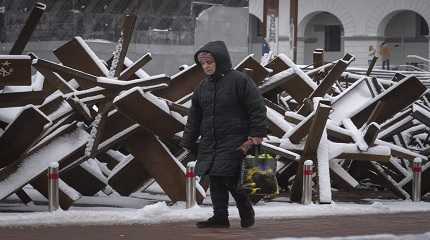
PARIS (AP) — Dozens of countries and international organizations threw their weight and hundreds of millions of euros (dollars) behind a fresh and urgent push Tuesday to keep Ukraine powered, fed, warm and moving this winter, responding defiantly to sustained Russian aerial bombardments that have plunged millions into the cold and dark by targeting critical infrastructure.
An international donor conference in Paris quickly racked up pledges of financial and in-kind support to help Ukraine’s beleaguered civilian population survive winter’s freezing temperatures and long nights.
Donor promises of immediate help to repair Ukraine’s bomb-battered power grid and other infrastructure were also accompanied by international pledges of long-term support for the country and strong condemnation of the Kremlin’s savaging of civilian targets.
French President Emmanuel Macron, in a speech opening the conference, described Moscow’s bombardments of civilian targets as a war crime. He said the Kremlin is attacking civilian infrastructure because its troops have suffered setbacks on the battlefields.
Moscow’s intention is to “plunge the Ukrainian people into despair,” Macron said.
The European Union’s chief executive, European Commission President Ursula von der Leyen, said the missile and drone bombardments are aimed at breaking Ukrainian morale but added: “Russia will fail.”
Ukraine President Volodymyr Zelenskyy, who spoke by video link, said 12 million Ukrainians are suffering power outages. In presenting a long list of immediate needs, Zelenskyy said his country requires electricity generators as urgently as it also needs armored vehicles and armored vests for its troops.
Donor pledges quickly surged past the 400-million euro mark, the equivalent of more than US$420 million, Macron’s office announced. The total included 125 million euros ($131 million) worth of aid from host France.
As temperatures plunge and snow falls, Ukraine’s needs are huge and pressing. Successive waves of cruise missiles and exploding drones since October have destroyed about half of Ukraine’s energy infrastructure, the Kyiv government says. It says Russia is trying to create a fresh wave of refugees to Europe. Russia says that by striking civilian infrastructure, its aim is to weaken Ukraine’s ability to defend itself.
In Ukraine, life for many is becoming a battle for survival.
“Globally we need everything,” said Yevhen Kaplin, who heads a Ukrainian humanitarian group, Proliska, providing cooking stoves, blankets and other aid to front-line regions and away from the battlefields.
With “the shelling, the missiles strikes and strikes on the infrastructure, we can’t say whether there will be gas tomorrow, we can’t predict whether to buy gas stoves or not,” he said. “Every day the picture changes.”
The Paris meeting — attended by 46 countries and 24 international organizations — also was putting in place a system to coordinate international aid this winter, so donors of equipment and other aid don’t double-up. A web-based platform will enable Ukraine to list its civilian aid needs, and allow donors to show what they’ll supply in response.
Sweden was among the first nations attending the meeting to pledge more aid. Its foreign trade minister, Johan Forssell, announced a contribution of 55 million euros (US$58 million) for humanitarian aid and the rebuilding of schools, hospitals and energy infrastructure.
As winter bites, “we need to do whatever we can to help improve conditions in Ukraine and also help them to fight off the Russian invaders,” he said. “We’re here for them as long as it takes.”




